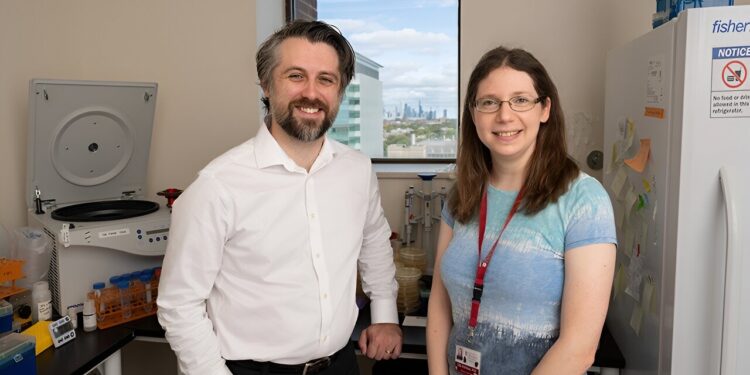Researchers from the Pritzker School of Molecular Engineering (PME) at the University of Chicago and UChicago Medicine, including Asst. Professor Mark Mimee (left) and researcher Ella Rotman showed that a mixture of bacteriophage collections could successfully treat antibiotic-resistant infections in mice. Credit: UChicago Pritzker School of Molecular Engineering / Jason Smit
Researchers have a new battle tactic to combat drug-resistant bacterial infections. Their strategy involves using collections of bacteriophages, viruses that naturally attack bacteria. In a new study, researchers from the Pritzker School of Molecular Engineering (PME) at the University of Chicago and UChicago Medicine have shown that a mixture of these phages can successfully treat antibiotic-resistant Klebsiella pneumoniae infections in the mouse.
At the same time, the team’s work revealed how complex interactions between phages and bacteria can be; Viruses thought to be most effective in isolated culture dishes have not always worked in animals. Additionally, phages and bacteria can evolve over time: in some cases, phages have evolved to be more effective at killing bacteria while in other cases, Klebsiella has developed resistance to the phages.
“We still think phages are an incredibly promising approach to treating drug-resistant bacteria such as Klebsiella,” said Mark Mimee, assistant professor of molecular engineering and senior author of the new work, published in Cellular host and microbe. “But phages are like a living and constantly evolving antibiotic, which gives them great complexity.”
Klebsiella pneumoniae is a common bacteria found in the intestines of humans, where it causes little harm. However, when bacteria escape to other sites in the body, such as open wounds, the lungs, the bloodstream, or the urinary tract, they can cause more serious infections. K. pneumoniae is often spread in hospital settings, and drug-resistant strains have become common.
“In my clinic, I see patients with recurrent urinary tract infections caused by Klebsiella,” says urogynecologist Sandra Valaitis, MD, of UChicago Medicine, co-author of the new work. “Often, these bacterial strains develop resistance to oral antibiotics, leaving patients with fewer options to clear the infection. We urgently need new ways to treat these bacteria.”
For more than a century, phages have been known as natural enemies of bacteria and studied for their potential to treat infections. However, phages are generally very specific to one type of bacteria and predicting these matches is difficult.
In this new research, Ella Rotman, a Mimee Lab scientist, analyzed wastewater to isolate phages that could effectively kill 27 different strains of Klebsiella, including 14 newly isolated from patients at the University of Chicago. The team identified several dozen phages capable of killing at least certain strains of Klebsiella. Next, the researchers analyzed which genetic factors in the bacteria made them most susceptible to being killed or weakened by each of these phages.
Based on this analysis, Rotman and his colleagues developed a mixture of five phages each targeting different components of the bacteria. In culture dishes as well as in mice, this phage cocktail made antibiotic-resistant Klebsiella bacteria more susceptible to attack by the immune system and, in some cases, more susceptible to antibiotic treatment. However, in other cases, the bacteria became more resistant to antibiotics after treatment.
“It’s one of those things where the biology often doesn’t work the way you want it to,” says Mimee. “But it gives us the opportunity to study the detailed dynamics between phages and bacteria.”
By exposing the phage mixture to a series of isolated Klebsiella bacteria, the researchers gave the phage the opportunity to evolve. This improved the cocktail’s ability to kill Klebsiella. In mice, the mixture effectively killed or weakened Klebsiella. The researchers observed coevolution between the bacteria and the phage in the mouse intestines, where Klebsiella evolved to escape the phage attack and the phage countered to better infect the engineered bacteria.
Mimee’s lab group is continuing its experiments to better understand how different pairs of phages and bacteria interact with each other and how the presence of other phages and bacteria, naturally present in the human body, influences this. At the same time, together with Valaitis, they are seeking approval from the Food and Drug Administration (FDA) for a small clinical trial testing the phage mixture in patients with urinary tract infections.
“This research is a positive step in trying to understand the complexity of phages and bring them closer to the clinic,” says Mimee.
More information:
Ella Rotman et al, Rapid design of bacteriophage cocktails to suppress the load and virulence of gut-resident carbapenem-resistant Klebsiella pneumoniae, Cellular host and microbe (2024). DOI: 10.1016/j.chom.2024.09.004
Provided by the University of Chicago
Quote: Phage cocktail shows promise against drug-resistant bacteria (October 4, 2024) retrieved October 5, 2024 from
This document is subject to copyright. Except for fair use for private study or research purposes, no part may be reproduced without written permission. The content is provided for informational purposes only.



